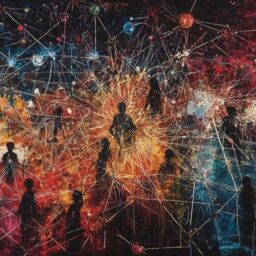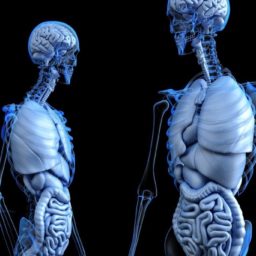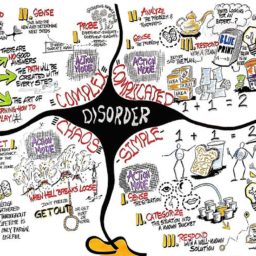
Many people believe that complexity is just higher-order complicatedness i.e. that there is a continuum and that the difference is one of degree, not type. When one considers however how very different these states are from each other, I tend to agree with Dave Snowden when he says that there are in fact phase shifts between them i.e. they are … | Sonja Blignaut Continue reading Complex and Complicated Systems Are Fundamentally Different Sonja Blignaut

The idea of a “problem” in a complex or complex adaptive system is misleading, as it suggests the existence of a clear, identifiable issue that can be resolved independently. In reality, what we perceive as problems are often symptoms of deeper, systemic patterns and interactions. | David Gurteen Continue reading There Are No Problems in Complex Systems David Gurteen

In a complex or complex adaptive system, the notion of “problem-solving” is an illusion. Instead of definitive solutions, there is only an endless series of adaptive responses. | David Gurteen Continue reading There Are No Solutions Only Responses in Complex Adaptive Systems David Gurteen

Retrospective Coherence in a Complex World What Is a System? ** Close Pop-up all posts in this chapter What’s the Vibe? Please be patient as this may take up to a minute to load… Close The world is fast-changing and increasingly more turbulent. The problems and challenges we face are both complex and adaptive and … Continue reading Introduction: Complexity The world is fast-changing and increasingly more turbulent

Introduction: Complexity Complex Is Not the Same as Complicated Close Pop-up all posts in this chapter What’s the Vibe? Please be patient as this may take up to a minute to load… Close Systems are integral to various aspects of life, from nature to technology. Understanding systems can be challenging due to their complexity and … Continue reading What Is a System? ** An interconnected set of elements organized in a way that achieves something

Complex Is Not the Same as Complicated Complex Systems ** Close Pop-up all posts in this chapter What’s the Vibe? Please be patient as this may take up to a minute to load… Close Distinguishing between complex systems and complex adaptive systems is essential. The challenge is that these terms are often used interchangeably. By … Continue reading Complex Systems and Complex Adaptive Systems ** Complexity

Complex Systems and Complex Adaptive Systems ** Complex Adaptive Systems ** Close Pop-up all posts in this chapter What’s the Vibe? Please be patient as this may take up to a minute to load… Close Complex Systems A complex system consists of many highly interconnected parts that dynamically interact with each other. The Internet and … Continue reading Complex Systems ** Many parts interacting with each other in multiple ways

Dispositional States ** The Vector Theory of Change Close Pop-up all posts in this chapter What’s the Vibe? Please be patient as this may take up to a minute to load… Close Emergence in a complex system refers to the phenomenon where new patterns, behaviors, or properties arise at the system level that cannot be … Continue reading Emergence in Complex Systems ** Complexity

Traditional change management methods, with their rigid plans and fixed outcomes, often struggle in today’s complex, unpredictable environments. Dave Snowden’s Vector Theory of Change offers a more adaptable solution by focusing on setting a broad direction (vector) rather than a specific goal. Continue reading The Vector Theory of Change Navigating change in a complex world

The Vector Theory of Change Exploring Uncertainty – the Role of Catalytic and Safe-to-fail Probes Close Pop-up all posts in this chapter What’s the Vibe? Please be patient as this may take up to a minute to load… Close Navigating complex systems requires innovative problem-solving approaches. Traditional linear methods often prove ineffective in unpredictable environments. … Continue reading Navigating Complexity with Safe-to-fail Probes The power of safe-to-fail probes

Navigating Complexity with Safe-to-fail Probes Technical Challenges and Complex Adaptive Challenges Close Pop-up all posts in this chapter What’s the Vibe? Please be patient as this may take up to a minute to load… Close Navigating complexity requires experimental techniques. Catalytic probes stimulate system reactions, while safe-to-fail probes allow controlled failure. Both enable learning and … Continue reading Exploring Uncertainty – the Role of Catalytic and Safe-to-fail Probes Essential Tools for Understanding and Influencing Complex Systems

Technical Challenges and Complex Adaptive Challenges Unintended Consequences Close Pop-up all posts in this chapter What’s the Vibe? Please be patient as this may take up to a minute to load… Close Complex systems defy simplistic problem-solving. Rather than definitive solutions, we can only respond to the intricate web of interconnected elements. In a complex … Continue reading There Are No Solutions to Complex Challenges Only an endless series of adaptive responses

Belief systems shape our understanding of reality. They are interconnected networks of ideas, not always accurate representations of truth. Examining and evolving our beliefs, while challenging, is crucial for personal growth and social progress. Continue reading Belief Systems Our beliefs are not isolated pieces of data that we can take and discard at will

Our World Is Hyperconnected We Humans Are Complex Close Pop-up all posts in this chapter What’s the Vibe? Please be patient as this may take up to a minute to load… Close In our hyperconnected world, complexity has surged, leading to heightened volatility, uncertainty, and ambiguity. This increased complexity poses significant challenges in predicting outcomes, … Continue reading Our World Is Complex It is a VUCA world









